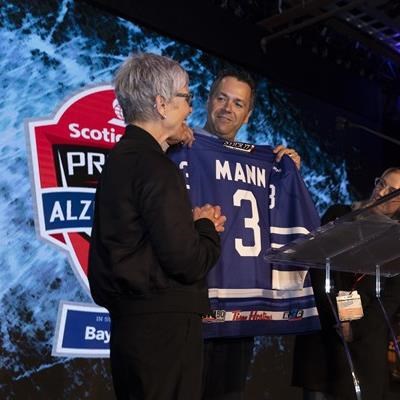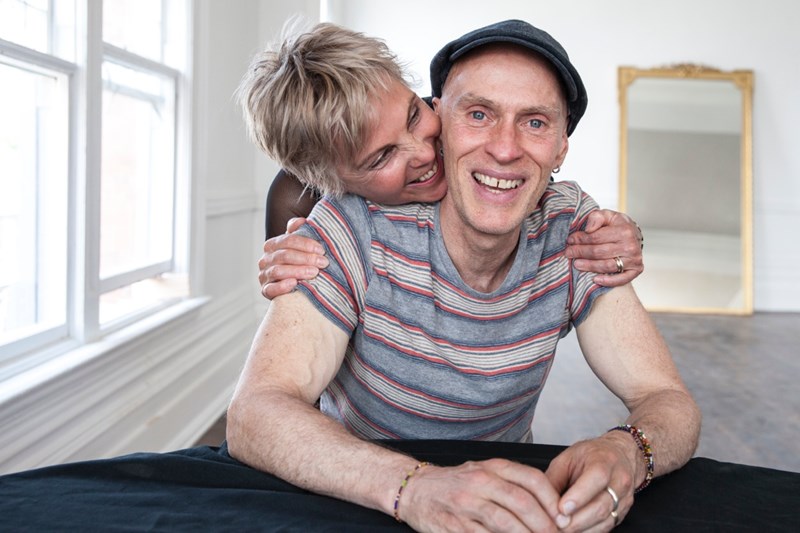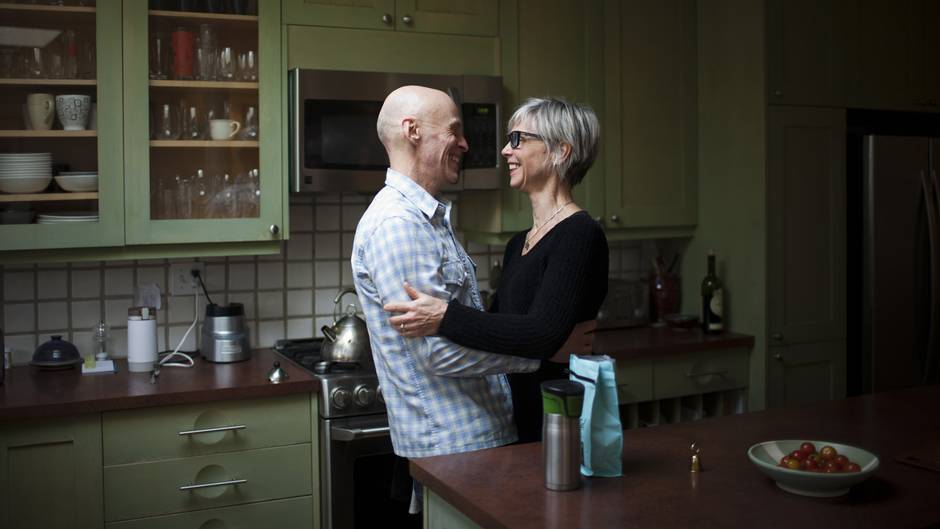On November 20, 2019, iconic Canadian folk rock singer John Mann passed away from early onset Alzheimer’s disease at the age of 57. John’s courageous journey battling dementia, and his wife Jill Daum’s brave, simultaneous journey as his caregiver, were an inspiration to all.
 Jill and John participated in the Baycrest Foundation’s Brain Project art exhibit in 2017 as contributing artists. In 2018, Jill and her daughter Hattie Daumann, gave a keynote address at the Scotiabank Pro-Am for Alzheimer’s in Support of Baycrest and helped to raise much-needed awareness, funds and support for those living with early onset dementia.
The following is a reposting of the Baycrest Foundation’s story and interview with Jill, published originally in the Fall/Winter 2017 edition of BrainMatters Magazine. Some details have been updated to reflect changes over the past two years.
The Baycrest Foundation extends our deepest sympathies to John’s family and devoted community of friends.
--
“You’ll have to excuse me, I’m not at my best I’ve been gone for a month, I’ve been drunk since I left. These so-called vacations will soon be my death. I’m so sick from the drink, I need home for a rest.”
Jill and John participated in the Baycrest Foundation’s Brain Project art exhibit in 2017 as contributing artists. In 2018, Jill and her daughter Hattie Daumann, gave a keynote address at the Scotiabank Pro-Am for Alzheimer’s in Support of Baycrest and helped to raise much-needed awareness, funds and support for those living with early onset dementia.
The following is a reposting of the Baycrest Foundation’s story and interview with Jill, published originally in the Fall/Winter 2017 edition of BrainMatters Magazine. Some details have been updated to reflect changes over the past two years.
The Baycrest Foundation extends our deepest sympathies to John’s family and devoted community of friends.
--
“You’ll have to excuse me, I’m not at my best I’ve been gone for a month, I’ve been drunk since I left. These so-called vacations will soon be my death. I’m so sick from the drink, I need home for a rest.”
That’s the opening verse to iconic Canadian folk song “Home for a Rest.” Co-written and sung by John Mann, front man for the Vancouver-based band Spirit of the West, the song remains a staple on playlists at dorms, bars and clubs across the country – a rallying cry to good times, good friends and joie de vivre.
The song, written in 1989 when Mann was 26, represented Mann’s signature, frenetic onstage performances, his care-free attitude and unlimited artistic potential.
But that was then.
In 2014, Mann was diagnosed with early onset Alzheimer’s disease (or young onset dementia) at age 51. In the years since, he has crammed as much activity, advocacy about brain health and living as he could in an effort to keep the disease at bay and set an example for anyone living with Alzheimer’s to never give up. Still, the disease continued to take its toll.

Young onset dementia accounts for an estimated 2-8% of all dementia cases. While rare, 16,000 Canadians under the age of 65 are living with young onset dementia.
1
When Mann and his partner of 30 years, actress and writer Jill Daum, were approached by the Baycrest Foundation in 2017 to participate in The Brain Project, an art fundraiser in support of brain health, they quickly agreed to join in.
Speaking to
BrainMatters in June 2017, Daum – who spoke for Mann in interviews because of his condition – said The Brain Project can do a lot for ending the stigma of Alzheimer’s.
“I said yes to The Brain Project because it’s very important for me to bring early onset Alzheimer’s outside of the shadows of shame,” she said. “The sicker John gets, the more I feel impassioned about this. To be quite honest, the more ill he gets, the more uncomfortable it makes us all… because we don’t know what to do and we’re faced with one of our biggest fears when we hang out with him. I think the more we’re exposed to it, the more conversations we have about it with caregivers, the better we’ll get at dealing with the disease.”
Sadly, the disease started to overtake Mann, despite his indomitable spirit and the support of his friends and family, Daum says.
“It’s pretty wild to think that Spirit of the West had their final performance at the Commodore Ballroom in Vancouver last year [on April 16, 2016]. Now, John is no longer singing at all. He can’t formulate the words. He only snaps his fingers to the music. About 30 per cent of the time, he doesn’t recognize the people around and with him – including me. So it’s been a pretty swift turn. It’s harder to engage with him now,” she adds, her voice breaking with emotion. “Those first times when he didn’t know who I was… they’re really painful. The first time his children were with him and he didn’t know who they were, it really hurt them.”
Despite the inexorable loss of his identity and the difficulty in witnessing it, Daum perseveres, saying she hopes initiatives like The Brain Project will encourage other caregivers to speak up about their challenges with loved ones who have dementia and find hope in their shared experiences.
“I’ve learned the extraordinary amount of patience it takes to care for someone with Alzheimer’s. I’ve learned the depth of the pain. The support that caregivers need is huge. I don’t think we can do enough for them,” she says.
 1. Alzheimer Society Canada statistics, 2017
1. Alzheimer Society Canada statistics, 2017